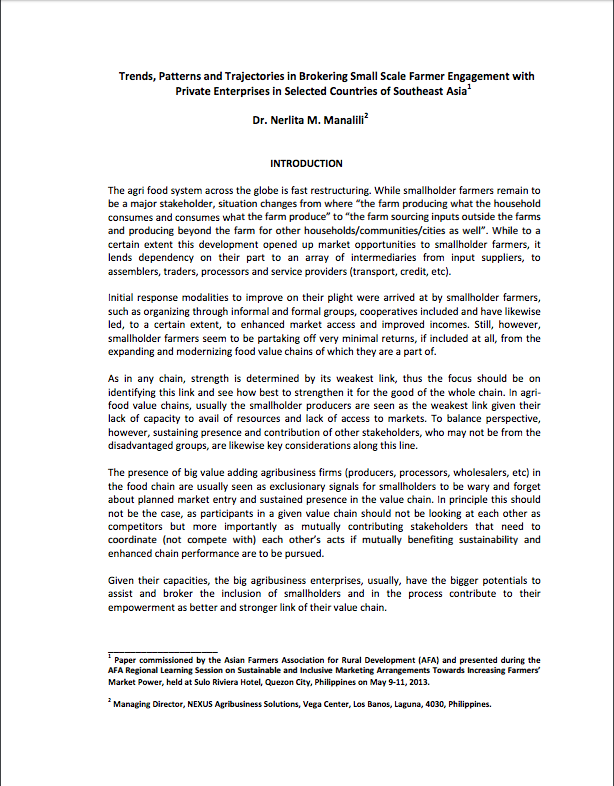The agri food system across the globe is fast restructuring. While smallholder farmers remain to be a major stakeholder, situation changes from where “the farm producing what the household consumes and consumes what the farm produce” to “the farm sourcing inputs outside the farms and producing beyond the farm for other households/communities/cities as well”. While to a certain extent this development opened up market opportunities to smallholder farmers, it lends dependency on their part to an array of intermediaries from input suppliers, to assemblers, traders, processors and service providers (transport, credit, etc).
Initial response modalities to improve on their plight were arrived at by smallholder farmers, such as organizing through informal and formal groups, cooperatives included and have likewise led, to a certain extent, to enhanced market access and improved incomes. Still, however, smallholder farmers seem to be partaking off very minimal returns, if included at all, from the expanding and modernizing food value chains of which they are a part of.
As in any chain, strength is determined by its weakest link, thus the focus should be on identifying this link and see how best to strengthen it for the good of the whole chain. In agrifood value chains, usually the smallholder producers are seen as the weakest link given their lack of capacity to avail of resources and lack of access to markets. To balance perspective, however, sustaining presence and contribution of other stakeholders, who may not be from the disadvantaged groups, are likewise key considerations along this line.
The presence of big value adding agribusiness firms (producers, processors, wholesalers, etc) in the food chain are usually seen as exclusionary signals for smallholders to be wary and forget about planned market entry and sustained presence in the value chain. In principle this should not be the case, as participants in a given value chain should not be looking at each other as competitors but more importantly as mutually contributing stakeholders that need to coordinate (not compete with) each other’s acts if mutually benefiting sustainability and enhanced chain performance are to be pursued.
Given their capacities, the big agribusiness enterprises, usually, have the bigger potentials to assist and broker the inclusion of smallholders and in the process contribute to their empowerment as better and stronger link of their value chain. It is within this premise that this regional paper was commissioned by the Asian Farmers Association for Sustainable Rural Development (AFA). To assess how the documented marketing tie ups were initiated, for what objectives where they created and to establish early indications of market empowerment on the part of the small farmers in the value chain. If so, what were the contributory factors and along what policy environment were they enabled. If not, what were the impediments to market empowerment and how can they be addressed.
The paper looked primarily on selected documented cases of marketing arrangements in Cambodia, Laos, Philippines and Thailand (commissioned to country authors by AFA following a standard outline) which were comparatively assessed. A case in Vietnam prepared within almost the same timeframe of the study by AFA’s project collaborator was likewise included. Assessments were done on who initiated, what were the objectives and if ever they were met. Trends and patterns observed were likewise discussed as additional insights and whenever possible compared with prevailing set ups.


